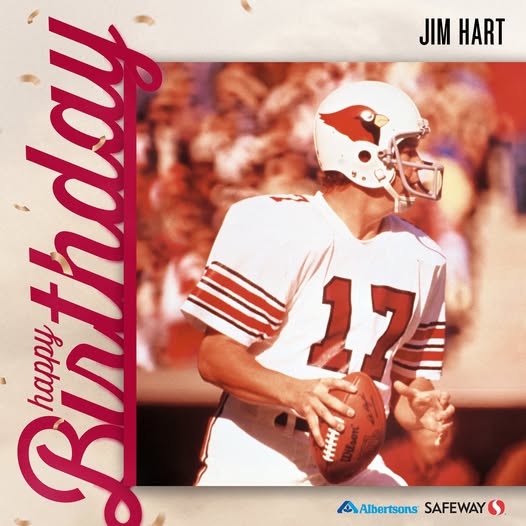In the ever-evolving tapestry of professional football, some names quietly endure—etched into franchise lore not by flash or spectacle, but by steady excellence, leadership, and an unwavering commitment to their team. Jim Hart, the longtime quarterback of the St. Louis Cardinals (now Arizona Cardinals), is one such name. On the occasion of his birthday, it is only fitting that we reflect on the legacy of this franchise icon, the all-time passing leader for the Cardinals, and a symbol of grit during an era that tested quarterbacks in ways modern players rarely experience.
Humble Beginnings
Born on April 29, 1944, in Evanston, Illinois, James Warren Hart did not arrive on the football scene with overwhelming fanfare. He wasn’t a blue-chip recruit. He didn’t attend a powerhouse collegiate program. Instead, Hart played his college football at Southern Illinois University, where his performance was good but not necessarily transcendent. Nevertheless, his size, arm strength, and football IQ caught the attention of NFL scouts—and in 1966, the St. Louis Cardinals gave him a shot as an undrafted free agent.
Few could have predicted that the young man from Southern Illinois would go on to become the cornerstone of the Cardinals’ offense for nearly two decades.
Rising Through the Ranks
Hart’s early NFL years were marked by challenges. The Cardinals were a middling team during the late 1960s, struggling to establish consistency. Hart saw sporadic playing time initially, competing with veteran signal callers and battling through some rough outings. But by 1967, he had begun to solidify his place as the team’s starter—a role he would hold, in some capacity, for the next 15 seasons.
The 1970s marked the peak of Hart’s career and coincided with the rise of the “Cardiac Cards,” a nickname affectionately given to the team for its penchant for heart-stopping finishes under head coach Don Coryell. From 1974 to 1976, Hart led the Cardinals to three consecutive 10-win seasons—an impressive feat in the pre-wild-card era when fewer playoff spots were available. The Cardinals made back-to-back playoff appearances in 1974 and 1975, an achievement that at the time marked the pinnacle of the franchise’s modern success.
A Quarterback of Consistency
Statistically, Jim Hart may not dazzle in the same way that modern passers do, but context is key. He played in an era when passing attacks were far less refined, the rules were far more favorable to defenses, and offensive lines were not the fortresses they are today. Despite these challenges, Hart delivered year after year, ultimately becoming the Cardinals’ all-time leader in every major passing category.
Over the course of his 18-year NFL career—17 of those with the Cardinals—Hart threw for 34,665 yards and 209 touchdowns. At the time of his retirement, those numbers placed him among the top quarterbacks in league history. Today, they still stand as a testament to his durability, productivity, and skill.
Perhaps most impressively, Hart started 180 games for the Cardinals—by far the most for any quarterback in franchise history. In a position where longevity is rare, his ability to endure speaks volumes about his toughness and preparation.
Leadership on and off the Field
More than just numbers, Hart was revered for his leadership. Teammates described him as calm under pressure, respected in the locker room, and intelligent in the huddle. Wide receiver Mel Gray and running back Terry Metcalf, two of Hart’s top weapons during the 1970s, flourished under his guidance.
Off the field, Hart carried himself with the same humility and class that defined his playing style. He rarely sought headlines, choosing instead to focus on the team’s success and on being a reliable presence. It’s no surprise that even after his playing career, he remained a beloved figure within the Cardinals’ organization and among fans.
A Career Defined by Loyalty
In today’s era of player mobility, Hart’s lengthy tenure with a single team is especially noteworthy. From 1966 to 1983, he wore the red and white of the Cardinals, through highs and lows, through coaching changes, injuries, and disappointments.
Despite never winning a Super Bowl, Hart’s legacy with the Cardinals is secure. He is the franchise’s all-time passing leader, a four-time Pro Bowl selection (1974–1977), and the face of one of the most memorable eras in Cardinals history.
When he left the Cardinals in 1984 to play a final season as a backup with the Washington Redskins, it marked the end of an era. But his heart—and his legend—remained in St. Louis.
Post-Football Contributions
After hanging up his cleats, Hart continued to make an impact. He returned to Southern Illinois University, his alma mater, where he served as athletic director. His presence elevated the school’s athletic profile and provided inspiration for student-athletes across the university.
Hart has also remained active in Cardinals alumni events and has been celebrated multiple times by the organization. While the team has moved from St. Louis to Phoenix, Hart’s contributions are still honored by fans in both cities. For longtime followers of the franchise, especially those who cheered in the old Busch Stadium, Jim Hart is still the quarterback.
The Jim Hart Legacy
As we celebrate his birthday, it’s important to recognize that Jim Hart’s career represents more than just touchdowns and wins. It embodies the values that football fans cherish—perseverance, loyalty, consistency, and leadership.
In a league that often measures greatness by rings, Hart’s story is a reminder that a player’s legacy can be just as profound through impact, longevity, and devotion to a single team. He never won MVP awards, never played in a Super Bowl, and yet he remains the most beloved quarterback in Cardinals history.
For many Cardinals fans, especially those who grew up watching football in the 1970s, the image of Jim Hart taking the snap under center, scanning the defense, and lofting a deep ball to Mel Gray or Pat Tilley is a core memory—a golden era, even if it didn’t end with a championship.
Honors and Recognition
Though not enshrined in the Pro Football Hall of Fame, Hart’s accomplishments have not gone unnoticed. He was inducted into the Missouri Sports Hall of Fame and remains on several “hall of very good” lists compiled by NFL historians who advocate for overlooked legends. Cardinals fans have long pushed for greater recognition of Hart’s impact, especially as the franchise increasingly looks back at its deep-rooted history.
He continues to receive tributes from former teammates, NFL alumni, and broadcasters alike—many of whom recall his football smarts and calm demeanor. As the Cardinals have transitioned into a new era with modern stars like Kyler Murray, the foundation built by Hart and his teammates is frequently invoked as a benchmark.
A Birthday Worth Celebrating
As Jim Hart turns 81, the football world salutes a player whose contribution to the game goes beyond numbers and records. He represents an era when quarterbacks were warriors, when loyalty to a team was common, and when the Cardinals—then a gritty, blue-collar team in St. Louis—were defined by their indomitable spirit.
Fans who were fortunate enough to watch him play remember the late-game drives, the poise in the pocket, the resilience in defeat, and the joy in every hard-earned win. They remember the excitement of Sundays in the ’70s, when Hart led a team that never quit.
Today, the Cardinals franchise is steeped in history. And central to that history is Jim Hart—a player who gave everything to the team, who led with class, and who continues to be a beacon for Cardinals pride.
So, happy birthday to Jim Hart—Cardinals legend, all-time passing leader, and forever a quarterback in the hearts of fans.



